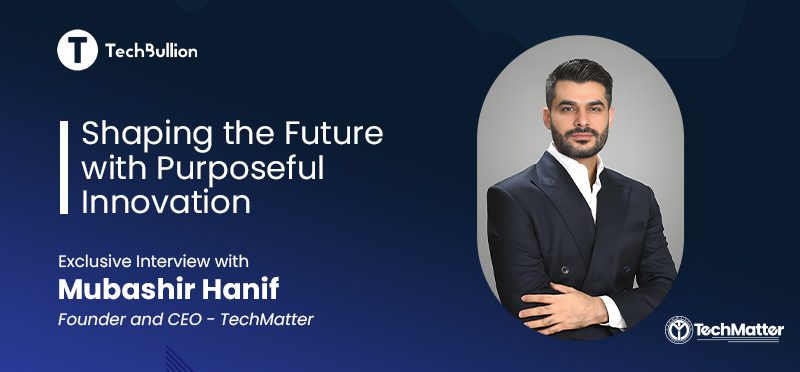Mubashir Hanif, Founder & CEO of TechMatter, has carved a remarkable path in the world of healthcare technology and managed IT services. With a background as a Chartered Certified Accountant (ACCA) and a strong foundation in sales and business strategy, Hanif combined his financial acumen with a passion for innovation to build one of the fastest-growing technology companies in the healthcare sector.
His journey is defined by bold choices. Rather than following a conventional career route, Hanif invested his time and energy into building TechMatter from the ground up. Today, the company offers Managed IT solutions to elite institutions such as NASA, Stanford University, and 911 emergency services, while its subsidiaries, RCM Matter and DoctorPapers, are reshaping revenue cycle management and healthcare compliance.
In 2025, Hanif was named among the Most Influential CEOs by CEO Monthly, receiving honors for Growth-Driven HealthTech Leadership and Best Strategic HealthTech Partner. This recognition reflects his relentless drive to position TechMatter as a global industry leader committed to reliability, compliance, and measurable results.
TechMatter works with some of the most high-profile institutions in the world. How did you establish that level of trust and credibility?
Trust is built on performance. NASA didn’t come to us because of marketing. It was because we delivered secure, reliable, mission-critical systems. Stanford saw our ability to manage complex IT environments at scale. And with 911, our job was to ensure continuity where seconds can mean lives. Once you prove you can handle those stakes, other clients immediately feel confident knowing the same rigor applies to their operations.
For readers unfamiliar with TechMatter, can you walk us through your core services and subsidiaries?
At its core, TechMatter is a full-spectrum IT and healthcare technology partner, offering expertise in revenue cycle management, managed IT services, cloud solutions, cybersecurity, data analytics, and digital marketing services.
Through RCM Matter, TechMatter delivers end-to-end revenue cycle management, now enhanced with a newly launched next-generation billing software called Curear, designed to reduce denials and optimize cash flow. Its second arm, DoctorPapers, provides streamlined credentialing and compliance support, helping providers stay audit-ready without the usual delays and bottlenecks.
Together, these solutions position TechMatter as a trusted strategic growth partner for healthcare practices, agencies, and institutions alike.
What inspired you to leave a stable career path and take the entrepreneurial leap into building TechMatter?
I had a secure career path in accounting and sales, but I kept running into the same problem. Organizations were struggling with inefficiencies that technology could easily solve, yet nobody was addressing those issues in a holistic way. I didn’t want to spend my life accepting “that’s just how things are.”
Instead, I wanted to build something that could truly change how businesses and healthcare providers operate. That’s why I took the leap and started TechMatter. It wasn’t an easy choice. There were risks, sacrifices, and long nights, but I knew the harder road was the right one. Looking back, that decision shaped everything we’ve built today.
You recently launched a billing software at RCM Matter. What makes this solution different from traditional billing platforms?
Most billing software on the market is transactional. They help you file claims but don’t solve systemic problems. RCM Matter’s new platform, Curear, is intelligence-driven. It not only manages claims but also predicts denials before they happen, flags compliance gaps in real time, and gives providers clear dashboards for decision-making. Curear is all about optimizing and future-proofing revenue cycles. Quite frankly, it is a game-changer for agencies struggling with shrinking margins and rising compliance requirements.
Can you share the response so far to the Curear software launch?
The response has been overwhelmingly positive. Early adopters include healthcare groups that were previously spending thousands fixing denied claims every month. With our medical billing software, they’ve reported up to a 95% reduction in denials and faster reimbursements. Providers love that it’s intuitive, compliance-ready, and backed by our billing specialists’ years of experience and expertise.
Healthcare compliance and billing are notoriously complex. How do TechMatter’s solutions address these challenges?
We look at the system end-to-end. RCM Matter ensures compliance, audits data for accuracy, and leverages smart alerts to prevent rejections. DoctorPapers eliminates bottlenecks by centralizing credentialing and keeping providers audit-ready at all times. Then, TechMatter’s IT backbone ensures that all these systems run on secure, HIPAA-compliant, cloud-based platforms with advanced disaster recovery. Additionally, our healthcare digital marketing services guarantee that our clients scale efficiently.
The healthcare industry is evolving rapidly. What do you see as the biggest challenges and opportunities for providers in 2025 and beyond?
The biggest challenge I see is the pressure providers face from every angle, which includes shrinking reimbursement rates, rising operational costs, and increasingly complex compliance requirements.
Too many agencies feel stuck in survival mode, buried under paperwork instead of focusing on patient care. But I also believe this is where the biggest opportunity lies. With the right technology, we can simplify compliance, automate the repetitive tasks that drain resources, and give providers real-time visibility into their financial health. That’s exactly what we’re doing with RCM Matter and DoctorPapers: turning those challenges into opportunities for growth.
Many leaders talk about digital transformation in healthcare. What does true digital transformation mean to you?
For me, digital transformation isn’t about having the latest software. It’s about rethinking how everything works. It means building simple workflows, adopting proactive compliance instead of reactive approaches, and giving providers more time to focus on scaling their operations rather than paperwork.
At TechMatter, we see it as creating outcomes, not just tools. Our new medical billing platform, Curear, predicts denials before they happen and keeps providers permanently audit-ready. That’s what digital transformation really means to me: making technology work for people, not the other way around.
Could you share a real-world success story that highlights TechMatter’s impact?
One healthcare agency we worked with was losing hundreds of thousands annually due to claim denials. Within six months of signing up for RCM Matter’s services, their denial rates dropped from 40% to 9%, and cash flow stabilized.
On the IT side, we worked with an emergency services client on disaster recovery. When they faced a real cyberattack, our protocols activated seamlessly, with no downtime or data loss. These stories capture what we stand for: not just providing services, but delivering peace of mind.
Company culture is often overlooked in tech. How have you shaped the culture at TechMatter to support growth and innovation?
From day one, I’ve believed that culture is everything. At TechMatter, we’ve built our culture around three principles: empowerment, fairness, and consistency. I want people to feel ownership of their ideas, to trust that leadership will always act fairly, and to know they can rely on consistency in how we operate. When employees feel valued and supported, they don’t just do their jobs; they innovate, they go above and beyond, and they create solutions that make a real difference. Our client success is a direct reflection of the culture we’ve built inside TechMatter.
Finally, what advice would you give to aspiring entrepreneurs or professionals who want to build companies that make a global impact?
My advice is simple: start with purpose, not just profit. Find a real problem worth solving and commit to it fully, even when the easier path seems more attractive. You need resilience because setbacks will happen, and the ability to keep moving forward is what separates those who succeed from those who don’t. And never underestimate the power of building the right team. No one achieves anything world-class alone. Surround yourself with people who share your vision, and together you can build something that truly makes a global impact.












Leave a Reply